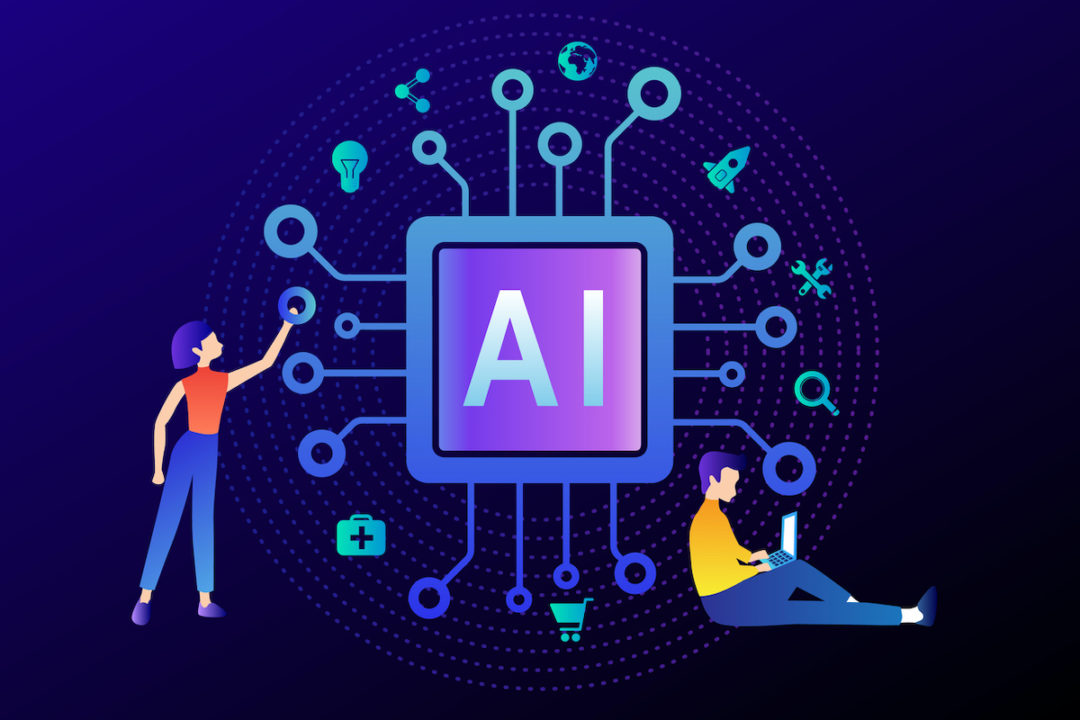
The supply chain, which encompasses the entire process from raw material sourcing to the delivery of the final product, is a critical component of modern business operations. Efficient supply chain management (SCM) ensures that goods are produced and delivered promptly and cost-effectively. However, managing a supply chain is complex and fraught with challenges such as demand forecasting, inventory management, logistics, and risk management. Artificial intelligence (AI) is increasingly seen as a transformative technology that can address these challenges and significantly enhance supply chain management. This blog will explore the role of AI in SCM, examining its applications, benefits, and future potential.
Introduction to AI in Supply Chain
Artificial intelligence is the simulation of human intelligence in machines programmed to think and learn like humans. AI technologies include machine learning (ML), natural language processing (NLP), computer vision, and robotics. These technologies can analyze vast amounts of data, identify patterns, make decisions, and perform tasks autonomously.
The Importance of AI in SCM
AI is revolutionizing supply chain management by automating complex processes, improving decision-making, and increasing efficiency. By leveraging AI, companies can enhance their supply chain operations, reduce costs, improve customer satisfaction, and gain a competitive edge in the market. AI’s real-time analysis of large datasets allows for more accurate demand forecasting, optimized inventory management, and improved logistics planning.
Applications of AI in Supply Chain Management
1. Demand Forecasting
Accurate demand forecasting is crucial for effective supply chain management. Traditional forecasting methods often rely on historical data and human judgment, which can be prone to errors. AI-powered demand forecasting uses machine learning algorithms to analyze vast amounts of data from various sources, such as sales history, market trends, weather patterns, and social media activity. This allows for more accurate predictions of future demand, enabling companies to optimize inventory levels, reduce stockouts, and minimize excess inventory.
2. Case Study: Walmart
Walmart, one of the world’s largest retailers, uses AI for demand forecasting. The company’s AI-driven forecasting system analyzes over 200 data variables, including promotional events, economic indicators, and social media trends. This has significantly improved forecast accuracy, leading to better inventory management and reduced operational costs.
3. Inventory Management
Efficient inventory management is essential to maintaining the right balance between supply and demand. AI can optimize inventory management by predicting demand fluctuations, identifying slow-moving items, and determining optimal stock levels. AI algorithms can also automate replenishment processes, ensuring that inventory is reordered at the right time and in the right quantities.
4. Case Study: Amazon
Amazon utilizes AI to manage its vast inventory across multiple fulfilment centres. The company’s AI-powered inventory management system uses machine learning algorithms to predict demand, optimize stock levels, and automate reordering. This has enabled Amazon to reduce stockouts, minimize excess inventory, and improve overall operational efficiency.
5. Logistics and Transportation
AI plays a significant role in optimizing logistics and transportation processes. AI algorithms can analyze real-time data from various sources, such as GPS tracking, traffic conditions, and weather forecasts, to determine the most efficient routes and delivery schedules. This helps reduce transportation costs, improve delivery times, and enhance customer satisfaction.
6. Case Study: DHL
DHL, a global logistics company, uses AI to optimize its transportation and delivery processes. The company’s AI-powered routing system analyzes real-time data from GPS devices, traffic reports, and weather forecasts to determine the most efficient delivery routes. This has reduced transportation costs, improved delivery times, and increased customer satisfaction.
7. Supplier Management
Managing suppliers is a critical aspect of supply chain management. AI can enhance supplier management by analyzing supplier performance data, identifying potential risks, and recommending optimal sourcing strategies. AI-powered supplier management systems can also automate supplier evaluation and selection processes, ensuring companies work with the best suppliers to meet their needs.
8. Case Study: Unilever
Unilever, a global consumer goods company, uses AI to manage its supplier network. The company’s AI-powered supplier management system analyzes supplier performance data, such as delivery times, quality metrics, and compliance records, to identify top-performing suppliers. This has enabled Unilever to improve supplier relationships, reduce supply chain risks, and enhance overall operational efficiency.
9. Risk Management
Supply chain disruptions, such as natural disasters, geopolitical events, and supplier failures, can significantly impact business operations. AI can help mitigate these risks by identifying potential threats, analyzing their impact, and recommending proactive measures. AI-powered risk management systems can also monitor real-time data from various sources, such as news reports, social media, and IoT devices, to detect potential disruptions and trigger appropriate responses.
10. Case Study: IBM Watson
IBM Watson’s AI-powered supply chain risk management system helps companies identify and mitigate supply chain risks. The system analyzes real-time data from various sources, such as weather reports, news articles, and social media, to detect potential disruptions. This enables companies to take proactive measures, such as rerouting shipments or finding alternative suppliers, to minimize the impact of disruptions on their operations.
11. Customer Service
AI can enhance customer service in supply chain management by providing real-time visibility into order status, delivery times, and inventory levels. AI-powered chatbots and virtual assistants can handle customer inquiries, track orders, and provide personalized recommendations, improving overall customer satisfaction.
12. Case Study: Sephora
Sephora, a global beauty retailer, uses AI-powered chatbots to enhance customer service. The company’s AI-driven chatbots can handle customer inquiries, track orders, and provide personalized product recommendations. This has resulted in improved customer satisfaction and increased sales.
Benefits of AI in Supply Chain Management
1) Improved Efficiency and Productivity
AI automates complex and time-consuming tasks, such as demand forecasting, inventory management, and logistics planning, allowing companies to operate more efficiently and focus on strategic activities. This leads to increased productivity, reduced operational costs, and improved overall performance.
2) Enhanced Decision-Making
AI’s ability to analyze vast amounts of data in real time enables companies to make more informed and data-driven decisions. AI-powered decision support systems can provide valuable insights and recommendations, helping companies optimize their supply chain operations and respond to changing market conditions.
3) Reduced Costs
AI can significantly reduce operational costs by optimizing various aspects of supply chain management, such as inventory levels, transportation routes, and supplier relationships. This leads to improved profitability and a stronger competitive position in the market.
4) Improved Customer Satisfaction
AI enhances customer service by providing real-time visibility into order status, delivery times, and inventory levels. AI-powered chatbots and virtual assistants can handle customer inquiries and provide personalized recommendations, improving customer satisfaction and loyalty.
5) Increased Agility and Resilience
AI enables companies to quickly adapt to changing market conditions and respond to supply chain disruptions. AI-powered risk management systems can detect potential threats and recommend proactive measures, helping companies mitigate risks and maintain business continuity.
Challenges and Considerations
1) Data Quality and Integration
AI relies on high-quality data to deliver accurate insights and recommendations. Ensuring data quality and integrating data from various sources can be challenging, especially for companies with complex and fragmented supply chain operations.
2) Cost and Implementation
Implementing AI solutions can be costly and time-consuming, requiring significant technology, infrastructure, and training investment. Companies must carefully evaluate the potential benefits and return on investment before implementing AI in their supply chain operations.
3) Security and Privacy
AI systems handle vast amounts of sensitive data, making them potential cyberattack targets. Ensuring the security and privacy of data is crucial to protect against data breaches and maintaining customer trust.
4) Change Management
Implementing AI in supply chain management requires a cultural shift and changes in organizational processes. Companies must invest in change management initiatives to ensure employees are adequately trained and prepared for the transition.
Future Potential of AI in Supply Chain Management
1) Autonomous Supply Chains
The future of supply chain management lies in developing autonomous supply chains where AI-powered systems can operate independently with minimal human intervention. Autonomous supply chains can optimize various real-time processes, such as demand forecasting, inventory management, and logistics planning, leading to increased efficiency, reduced costs, and improved overall performance.
2) Predictive and Prescriptive Analytics
AI’s ability to analyze vast amounts of data and identify patterns will lead to more advanced predictive and prescriptive analytics in supply chain management. Predictive analytics can provide insights into future trends and demand patterns, while prescriptive analytics can recommend optimal actions to achieve desired outcomes. This will enable companies to make more informed and proactive decisions, enhancing their supply chain operations.
3) Blockchain Integration
Blockchain technology can enhance supply chain transparency, traceability, and security. Integrating AI with blockchain can provide real-time visibility into supply chain transactions, enabling companies to track products from raw material sourcing to final delivery. This can help reduce fraud, improve compliance, and enhance overall supply chain integrity.
4) IoT and Real-Time Data
The Internet of Things (IoT) enables real-time data collection from various sources, such as sensors, RFID tags, and GPS devices. Integrating AI with IoT can provide real-time insights into supply chain operations, enabling companies to monitor and optimize processes more effectively. For example, AI-powered systems can analyze data from IoT devices to detect equipment failures, optimize maintenance schedules, and improve overall asset management.
5) Collaborative Supply Chains
AI can facilitate collaboration between different stakeholders in the supply chain, such as suppliers, manufacturers, and logistics providers. AI-powered platforms can enable real-time data sharing, communication, and coordination, leading to more efficient and responsive supply chain operations. Collaborative supply chains can enhance performance, reduce costs, and improve customer satisfaction.
The role of AI in enhancing supply chain management is undeniable. AI’s ability to analyze vast amounts of data, automate complex processes, and provide real-time insights is transforming how companies manage their supply chains. From demand forecasting and inventory management to logistics optimization and risk management, AI is driving significant efficiency, productivity, and customer satisfaction improvements. As AI technologies continue to evolve, the future of supply chain management looks promising, with autonomous supply chains, advanced analytics, blockchain integration, and IoT-enabled real-time data playing pivotal roles. By embracing AI and leveraging its potential, companies can enhance their supply chain operations, gain a competitive edge, and thrive in an increasingly dynamic and complex business environment.



